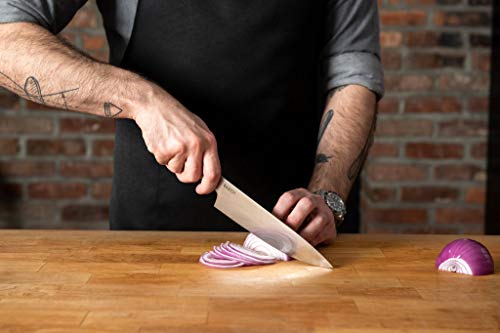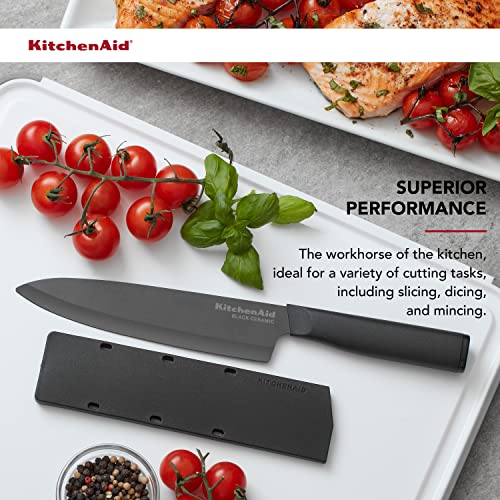Most kitchen knives are made of steel, but if you know about the benefits of a ceramic blade then you’ll want to read the rest of this ceramic vs steel knife article. Despite their obvious differences in material, you’ll be surprised how similar these two knives are as well.
There are plenty of arguments for purchasing either a ceramic or a steel knife, and we’ll cover all that and more in this detailed battle of the knives!
What is a ceramic knife?
By definition, a ceramic knife is a knife with a blade made from zirconium dioxide, an element with polymorphism properties. As one of the hardest material substances known to man (right next to diamond), ceramic blades offer strength and durability, and since it’s not a metal it won’t rust or corrode.
Ceramic knives are quite lightweight compared to metal knives. However, its ultra-hardness makes it more susceptible to chipping and cracking against hard ingredients.
Related: The 7 Best Ceramic Knives You Can Buy (Our Top Pick Revealed!)
What is a steel knife?
A steel knife typically incorporates a blade made of stainless steel consisting of an alloy of iron, carbon, nickel, and other compounds. Depending on the type of steel alloys used, stainless steel knives can vary in hardness, rust resistance, and durability.
The downside of steel blades is that they are susceptible to things like rust and corrosion, particularly when exposed to moisture.
How are they different?
All the differences between steel and ceramic knives come from their materials and their implications. For example, steel knives offer a thicker blade for heavy chopping tasks. These include thick pieces of meat or cutting open a pineapple (1).
Ceramic knives are more lightweight, allowing the user to get better lasting results with long and tedious chopping tasks as the hand is not strained.
Another key difference is the blade’s hardness. Ceramic knives typically being harder, but stainless steel knives offer more variety in HRC levels. Furthermore, the high carbon alloys and chromium content of steel knives make them more resistant to corrosion and rust from moisture exposure.
On that note, ceramic knives are not even metal to begin with. So, you won’t get any rusting or corroding whatsoever with ceramic-coated knives.
However, ceramic knives are at a greater risk of chipping and cracking, as often due to harder blade levels. In addition, the razor-sharp edge of steel knives often requires more work to ensure the edge remains sharp. This makes it relatively difficult to maintain the cutting abilities of the steel blade.
Contrastingly, sharpening ceramic knives rarely needs to be done as the ultra-hard material results in the edge lasting significantly longer.
Related: Ceramic vs Stainless Steel Cookware: Which is best for you?
How are they similar?
Despite their differences, there are several similarities between these two types of kitchen knives. For instance, both steel and ceramic material offer a fair amount of strength and durability. This offers great results and lasting performance.
Whether you use a steel knife or a ceramic knife, both are great for cutting soft or wet foods. In addition, both are made for a wide variety of cutting tasks. These include finely slicing boneless meats, cutting vegetables, and handling similar delicate foods.
In terms of product offerings, both ceramic and steel knives offer a wide range of different knives and knife set options to choose from. These products typically include a chef’s knife, bread knife, utility knife, paring knife, and steak knives.
Both ceramic and steel knives are available in various quality levels. These include high-end to low-cost budget knives, appealing to homeowners and professional chefs alike.
What’s better about ceramic knives?
Almost all ceramic knives are made at hardness levels well above 60 HRC. This means they can retain their edge for long periods without needing sharpening. On that note, ceramic knives are also easier to clean due to the highly dense material that sports fewer openings for dirt to creep in.
As such, you can easily clean your ceramic knives with a rinse of warm water. This is unlike the average metal knife that requires a fair amount of scrubbing and detergent.
What’s better about steel knives?
A stainless steel knife may not be as hard as a ceramic knife, but this has its own advantage in preparing foods. The steel blade’s ability to bend and twist towards its ingredient’s shape and texture allows you to cut into even hard foods without the knife chipping.
Furthermore, it’s a lot easier to sharpen steel knives than ceramic ones. You won’t have to invest in an expensive sharpening diamond as plenty of materials are harder than steel.
Who should get ceramic knives and why?
Ceramic kitchen knives suit anyone willing to pay a little extra for an ultra-hard knife set, as they are typically priced higher on average. Unfortunately, while budget ceramic knives do indeed exist, they are a little rarer and harder to find. So my advice is to be willing to spend a little more.
Of course, the benefits of ceramic knives are extraordinary. I’d highly recommend them to anyone who wants to spend less time cleaning and maintaining their knives. This opens up more time to enjoy their cutting prowess.
Who should get steel knives and why?
Steel kitchen knives suit anyone who prefers adequately sharp and flexible knives that won’t chop or crack under pressure. A steel knife is perfect for cutting hard foods such as frozen meat or coconuts. Since these knives are mass-produced globally and are quite popular among home cooks, it’s not hard to find cheap knives of this type.
Problems and issues of each
The main issue with ceramic knives is that they don’t perform well against tough ingredients like frozen foods or hard bones. In addition, their ultra-hard blades make them more prone to chipping and cracking. Also, ceramic knives are more likely to break if you drop them on the floor, so if you’re clumsy like me, I’d advise against it!
Steel knives are a little more lenient with human errors and more forgiving when you drop them on the ground. This makes it a popular choice for the common home cook. However, they require a lot more maintenance to maintain their sharp edge. In addition, they may be prone to rust and corrosion.
In addition, the blade is made of metal, which could transfer tastes from different foods if not cleaned properly after each use.
Reason for buying each type
The main ceramic knife pros that make it a valid option for purchase include its extra hard blade, and absence of rust and corrosion. It also has reduced cleaning and maintenance requirements. They may cost you a little more on average, but there’s no better way to invest your money for the right person.
Ceramic knives guarantee longevity, durability, and lasting performance for fine slicing and chopping tasks. So, avoid cutting frozen meat and bones for best results.
Steel knives are great for tackling a variety of foods, including soft green vegetables, frozen foods, and bones. This works for even decorative cutting tasks like preparing slivers. Steel performances vary by knife, and their abundance of construction and design choices gives customers more options and specialist knives to pick from.
Ultimately, I’d recommend high-carbon steel knives for those looking to take on tough ingredients. Also, those who don’t mind sharpening the blade regularly.
Related: Best Chef Knife For Under $100
Features
Blade
The ceramic knife blade is one of the hardest materials known to man, falling short only to the hardest of them all, diamond (2). As such, ceramic knives have minimal maintenance requirements and are super easy to clean.
Unlike steel blades prone to rust and need constant sharpening, the ceramic blade contains no metal, so none of those issues.
Winner: Ceramic knives
Durability
Both ceramic and steel knives are super durable in their own ways, and both are built to last a lifetime if cared for properly. Steel knives are less prone to chipping and cracking, while ceramic knives are less prone to rusting and corroding.
In terms of lasting the distance, however, steel knives have a slight advantage if properly cared for. On the other hand, they allow for more abuse by tough ingredients and human error. E.g., dropping the knife on the floor.
Winner: Steel knives
Ceramic vs. steel knife FAQ
Is a ceramic knife better than steel?
In terms of rust resistance and maintenance requirements, ceramic knives are better than steel as they do not contain metal and are super hard.
What is the disadvantage of ceramic knives compared to steel knives?
Unlike steel knives which can take on frozen meats and bones, ceramic knives are likely to chip or crack against tough surfaces due to a harder and more dense blade.
Are ceramic blades sharper than steel?
Ceramic blades tend to be sharper than steel on average as they are made with a sharper edge to compensate for the hard and dense blade.
What is the most disadvantageous thing about ceramic knives?
The greatest pitfall of ceramic knives is their vulnerability to chipping and cracking, as the ultra-hard blade reduces its cutting flexibility and adaptability.














